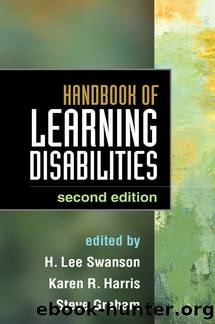Handbook of Learning Disabilities (9781462508563) by unknow

Author:unknow
Language: eng
Format: epub
ISBN: 9781462508563
Publisher: Guilford Pubn
CHAPTER 19
Developing a New Intervention to Teach Text Structure at the Elementary Level
JOANNA P. WILLIAMS and LISA S. PAO
The ability to gain information from text is a crucial skill in todayâs information age. To succeed in college and in the workforce, students need to develop critical thinking skills and to understand the languages used in disciplines such as math, history, and science (Moss, 2005). To use the Internet to access, evaluate, and synthesize information, they need to be able to understand the text on websites, most of which is expository (Kamil & Lane, 1997). Additionally, the current emphasis on standards-based education, standardized test performance, and technological literacy has made it more important than ever that students be able to read and comprehend expository texts (Moss, 2005).
Duke and Bennett-Armistead (2003) argue that early exposure to expository texts is essential for laying the foundation for studentsâ understanding. This is especially important because by the time students are in sixth grade, more than 75% of their school reading assignments deal with expository texts (Moss, 2005). Additionally, experience with expository texts has important implications for studentsâ background knowledge: Reading expository texts increases domain knowledge, which in turn increases vocabulary, fluency, and motivation (Guthrie, Anderson, Alao, & Rinehart, 1999). However, perhaps the most critical reason for teaching expository texts is simply that they are especially challenging for struggling young readers. When childrenâespecially those with language difficulties or deficitsâdo not receive sufficient exposure to and instruction about expository texts, they have increasing difficulties in reading and in meeting academic demands (Hidi & Anderson, 1986; Kucan & Beck, 1997; Williams & Pao, 2011).
There are several reasons why children find expository texts especially difficult. First, students come to school less experienced with expository text than with narrative text; children are exposed to narrative structure via real-life activities such as watching television and movies, having adults read to them, and listening to adultsâ conversations (Williams & Pao, 2011). Second, unlike narrative text, which tends to follow a single structure in which plot events are sequenced along a causalâtemporal line, expository text is structured several different ways, in terms of description, sequence, compareâcontrast, causeâeffect, problemâsolution, argument, and explanation (Calfee & Chambliss, 1987; Meyer, 1985). Third, expositions often deal with unfamiliar content; not only are the ideas less familiar but they are also often more complex (Hidi & Anderson, 1986; Kucan & Beck, 1997). Together, these reasons underscore the importance of having teachers help students begin to navigate expository texts. Unfortunately, recent studies reveal that they often do not.
In a study of first-grade classrooms, Duke (2000) found that first-grade students spent only 3.6 minutes on average with expository text per day. Moss and Newton (2002) examined basal readers used in the second, fourth, and sixth grades and noted that only 20% of the pages contained expository text. Armbruster and colleagues (1991) observed 192 lessons in fourth-grade science and social studies classrooms and found no examples of explicit instruction in how to read and learn with text. This lost opportunity to learn from expository text is both a cause and a consequence of studentsâ problems with text structure.
Download
This site does not store any files on its server. We only index and link to content provided by other sites. Please contact the content providers to delete copyright contents if any and email us, we'll remove relevant links or contents immediately.
Rewire Your Anxious Brain by Catherine M. Pittman(18656)
Talking to Strangers by Malcolm Gladwell(13371)
The Art of Thinking Clearly by Rolf Dobelli(10489)
Mindhunter: Inside the FBI's Elite Serial Crime Unit by John E. Douglas & Mark Olshaker(9344)
Becoming Supernatural by Dr. Joe Dispenza(8218)
Change Your Questions, Change Your Life by Marilee Adams(7783)
Nudge - Improving Decisions about Health, Wealth, and Happiness by Thaler Sunstein(7709)
The Road Less Traveled by M. Scott Peck(7603)
The Lost Art of Listening by Michael P. Nichols(7506)
Mastermind: How to Think Like Sherlock Holmes by Maria Konnikova(7348)
Enlightenment Now: The Case for Reason, Science, Humanism, and Progress by Steven Pinker(7314)
Win Bigly by Scott Adams(7199)
The Way of Zen by Alan W. Watts(6615)
Daring Greatly by Brene Brown(6514)
Big Magic: Creative Living Beyond Fear by Elizabeth Gilbert(5775)
Grit by Angela Duckworth(5615)
Ego Is the Enemy by Ryan Holiday(5451)
Men In Love by Nancy Friday(5240)
The Laws of Human Nature by Robert Greene(5209)
